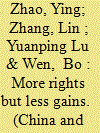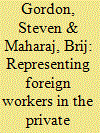|
|
|
Sort Order |
|
|
|
Items / Page
|
|
|
|
|
|
|
| Srl | Item |
| 1 |
ID:
154446


|
|
|
|
|
| Summary/Abstract |
This study draws on a survey of migrants in 12 cities across four major urbanizing areas in China and investigates the structure of migrant worker families' urban and rural consumption. The results show that the structure of migrant worker families' consumption has been dominated by survival consumption. These families tend to live frugally in cities while engaging in conspicuous consumption in their rural hometowns. The structure of migrant worker families' consumption is mainly shaped by their income stability and wealth levels rather than their current income level. Moreover, migrant worker families with high educational levels and those who intend to settle permanently in cities are likely to allocate substantial expenditure to status and hedonic consumption and to upgrade their urban consumption structure.
|
|
|
|
|
|
|
|
|
|
|
|
|
|
|
|
| 2 |
ID:
078276


|
|
|
|
|
| Publication |
2007.
|
| Summary/Abstract |
Migrant workers, meaning those who used to be farmers but have left rural areas and found jobs in cities as a result of economic reform and rapid development in China, have made a significant contribution to the burgeoning labor market and played an important role in speeding up the transition from a planned to a market economy. This present paper considers the economic status and social attitudes of migrant workers. It is based on the analysis of a large-scale survey in 2006, which was conducted using questionnaires and covered 28 provinces, municipalities and autonomous regions throughout the country. It was found that the income status of migrant workers depends heavily on the education and technical skills that they have developed, rather than on identity-based discrimination. Surprisingly, it was also found that those on less income and of lower economic and social status show more positive attitudes to society than those who are affluent and considered of higher social status. It is concluded that the decisive factor in attitude and behavior of migrant workers is historic rather than economic.
|
|
|
|
|
|
|
|
|
|
|
|
|
|
|
|
| 3 |
ID:
090697


|
|
|
| 4 |
ID:
172371


|
|
|
|
|
| Summary/Abstract |
This paper analyses labour migration and relocation of apparel production between Thailand and Myanmar during the first half of the 2010s. For a long time, unskilled migrant workers allowed labour-intensive industries such as the apparel sector to flourish in Thailand. However, higher costs have gradually decreased the competitiveness of the Thai garment industry, forcing implementation of industrial upgrading measures and relocation of some labour-intensive production to neighbouring countries. Conversely, Myanmar, a major source of migrant workers for Thailand, has increased its apparel exports since 2010. Using empirical evidence, this study reveals that, first, the Thai apparel industry has significantly upgraded while employing foreign workers and second, production networks between the two countries have solidified over the past decade.
|
|
|
|
|
|
|
|
|
|
|
|
|
|
|
|
| 5 |
ID:
077175


|
|
|
|
|
| Publication |
2007.
|
| Summary/Abstract |
With the introduction of capitalist labor relations into China certain attitudes, competencies, and values associated with global capitalism seem to be increasingly valorized. This article analyzes the values and principles ascribed to migrant workers as part of practices linked to modes of government. The author confronts the dominant form of cultural construction of migrant workers through the Shenzhen official press with migrant workers' own narratives about their experience of work (dagong) in the city as the narratives are mediated through two different sites, namely, participant observation, interviews with rural migrants, and a body of unpublished letters to the editor acquired from several magazines dedicated to migrant workers. The article sheds light on the ways in which migrant workers' narratives confirm or, on the contrary, contest the pivotal elements of the hegemonic construction. Three different narratives that migrant workers produce about their own lives and about Shenzhen are examined. These narratives range from affirmations of dominant discourses about migrant workers and expressions of disillusionment about such discourses, to strategic uses of dominant discourses to justify the claims made by migrant workers.
|
|
|
|
|
|
|
|
|
|
|
|
|
|
|
|
| 6 |
ID:
191156


|
|
|
|
|
| Summary/Abstract |
In view of its aging population, China initiated in 2012 a relaxed birth control policy after a three-decades-long implementation of the restrictive one-child policy. This paper examines how China's relaxed birth control policy leads to gender inequality. It specifically focuses on migrant workers because they account for a significant portion of the working group. Using the National Migrant Population Dynamic Monitoring Survey from 2014 to 2016, we found that China's two-child pilot policy reduced female labor force participation by 1.4 percentage points. This negative effect was more pronounced for women with higher educational levels or working in the private sector because employers foresee greater risks of productivity decline. We demonstrated that the gender pay gap increased from RMB956 to RMB1,053 during this same period. Pinpointing these unintended consequences brought about by the relaxation of the one-child policy helps provide a more complete picture of inequality and make sense of persistent relative poverty in Chinese society. To counteract gender discrimination, females are advised to work outside their home jurisdictions and take advantage of positive peer effects.
|
|
|
|
|
|
|
|
|
|
|
|
|
|
|
|
| 7 |
ID:
131796


|
|
|
|
|
| Publication |
2014.
|
| Summary/Abstract |
In recent years South African cities have become home to a large number of undocumented migrant workers. If trade unions do not organise undocumented migrant workers, it opens up such workers to exploitation and maltreatment by employers, thereby creating a split labour market that undermines the entire labour movement. This article focuses on the responses of the national trade union movement in the private security sector to the presence of undocumented workers at the grassroots level. Using a case study approach, we find that the pressures of labour market informalisation in the industry prompt unions to seek to maintain and advance their position from their traditional support base of citizen workers rather than attempt to include new groups. The failure to engage is reinforced by anti-immigrant attitudes which link foreigners with problems in the industry such as low wages and portrays such workers as co-conspirators rather than comrades. While justice and solidarity have always been the foundation of trade unionism in South Africa, the movement is in danger of failing this test if the current situation in terms of the exclusion of undocumented foreign workers persists.
|
|
|
|
|
|
|
|
|
|
|
|
|
|
|
|
| 8 |
ID:
161827


|
|
|
|
|
| Summary/Abstract |
Using the data from an original survey on rural migrant workers from Suzhou industrial sector in 2013, we estimate the wage effect of both union membership and union coverage across the wage distributions using decomposition approach based on unconditional quantile regression. The results show that union membership has a significant effect on the wage level of rural migrant workers across the wage distribution. The effect of coefficient differences which results from the different rewarding systems explains the majority wage differentials between union members and non-members in non-unionized firms. There is also significant union coverage effect at the lower part of the distribution when comparing the union-covered non-member to the nonunion-covered non-member, which is also mainly caused by the coefficient effect. By contrast, wage differentials between union members and non-members in unionized firms are attributed to significant composition effect, which reveals that union members are positively selected within unionized firms. As a result, the positive wage effect of union is limited to the more advantaged group among migrant workers.
|
|
|
|
|
|
|
|
|
|
|
|
|
|
|
|
|
|
|
|
|